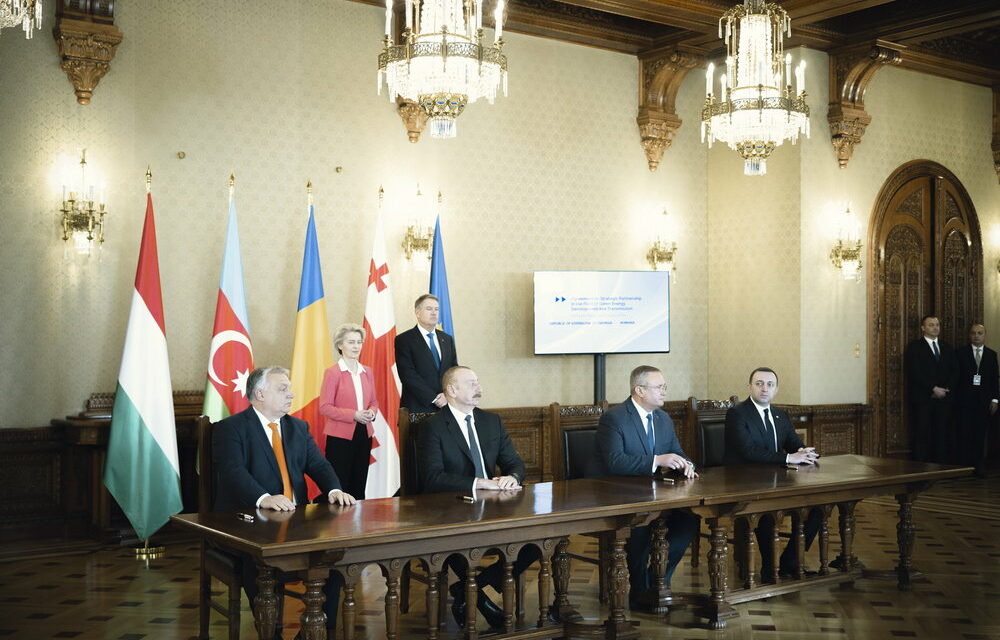Hungary and its partners have committed to a unique investment in the world, we are preparing to build the world's longest undersea electricity line, Prime Minister Viktor Orbán announced on Saturday in Bucharest, before signing the contract on the electricity network that will transport electricity from Azerbaijan to Hungary via Georgia and Romania.
The prime minister emphasized that
the European Union is in a strategic vacuum, in which the leaders of the countries must ensure that they create economic and energy security for their countries.
He added: the solution is to find and deliver new energy sources to Europe.
There is an energy source in reasonable proximity around the Caspian Sea, and the just-announced pipeline is an innovative solution for exploiting it, said the Prime Minister.
Viktor Orbán highlighted
the current situation in Europe is "as confused as it has ever been."
There is a war in our neighborhood, there is a serious energy crisis - which is not only a price crisis but also a supply crisis - meanwhile inflation is sweeping across the entire European economy, European leaders have decided to separate the Russian economy from the European economy, and on top of that, the United A series of market protection measures, unprecedented in the United States and affecting Europe as well, has begun, he listed.
All of this means that the era of European economic history in which we imported cheap raw materials and energy from Russia in exchange for Western technology, resulting in economic growth and military security for both sides, is over. However, there is no new strategy, which is why a strategic vacuum has developed, he pointed out.
He voiced:
in this situation, innovation is the only solution, and the pipeline just announced is a real innovative investment.
The undersea pipeline, which mainly supplies electricity from wind and solar energy production from Azerbaijan, will be 1,195 kilometers long and will also connect Romania and Georgia with an optical cable suitable for fast internet data transmission. Its capacity reaches 1,000 megawatts.
In addition to Viktor Orbán, Romanian Prime Minister Nicolae Ciuca, Azerbaijani President Ilham Aliyev and Georgian Prime Minister Irakli Garibasvili signed the contract in the presence of European Commission President Ursula von der Leyen.
In his speech, the Prime Minister praised that the EU has paid a lot of attention to Azerbaijan in the recent period, developed cooperation, and the President of Azerbaijan, Ilham Aliyev, was also open to cooperation.
"I have also experienced for more than a decade that the European Union can always count on Azerbaijan as a reliable partner," he declared.
Viktor Orbán also mentioned that he came back to Bucharest after eight years and experienced huge progress, which, in his view, justified Romania's membership in the Schengen zone. But the other day "we made a wrong decision in the EU" - he reminded - and this must be corrected, Romania must be included in the free movement zone. The Prime Minister assured the Romanian President Klaus Iohannis, who was in charge of Saturday's event, that Bucharest can count on Hungary in this.
According to a press release from the Ministry of Foreign Affairs and Trade, Minister of Foreign Affairs and Trade Péter Szijjártó reported that, following the agreement just signed, our country will be able to import green electricity from the South Caucasus country thanks to the wind farm investments to be made on the Caspian Sea and the construction of a 3 gigawatt pipeline.
He emphasized: the undersea part of the pipeline will be 1,195 km long, which is considered a new world record in this regard.
An Italian company was already commissioned for the feasibility study in April, the cost of which is 2.5 million euros will be covered by the World Bank, and the document will be ready by the end of next year. From then on, the investment could take three to four years, he informed.
He added: Azerbaijan is currently gathering investors to install wind farms in the offshore areas of the Caspian Sea.
Péter Szijjártó welcomed the fact that the European Commission is treating the project as an investment of common interest, and that is why it planned a support of 2.3 billion euros for the development.
He called the laying of the 500-kilovolt line a huge engineering feat, emphasizing that the network loss is already high at such a distance, and that the deeper the line runs, the more pressure it must withstand.
Péter Szijjártó stated that there are also plans to lay an optical cable next to the line.
The minister stated: "an energy supply crisis has hit its head all over Europe, the solution to which is not the natural gas or oil price cap, because that will further reduce the amount that will be available, but here new sources of energy must be discovered and directed in the direction of Europe."
MTI
Cover image: Prime Minister Viktor Orbán (b), Azerbaijani President Ilham Aliyev (b2), Romanian Prime Minister Nicolae Ciuca (b3) and Georgian Prime Minister Irakli Garibasvili (b4) in the photo published by the Prime Minister's Press Office from the electricity network that supplies electricity from Azerbaijan to Hungary via Georgia and Romania at the signing of the contract in Bucharest, at the Cotroceni Palace on December 17, 2022.
In the background are Ursula von der Leyen, President of the European Commission (b) and Romanian President Klaus Iohannis. MTI/Prime Minister's Press Office/Zoltán Fischer












